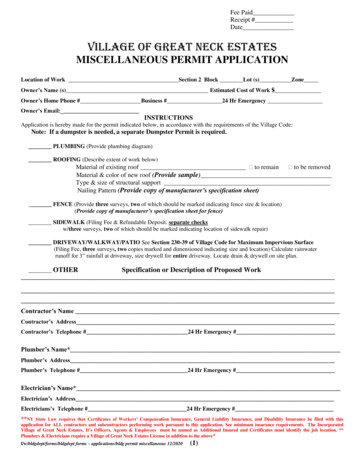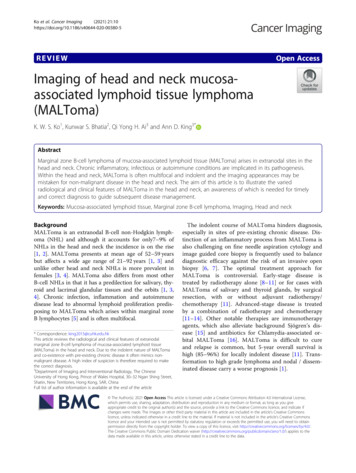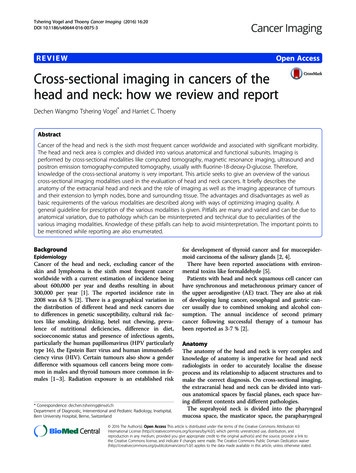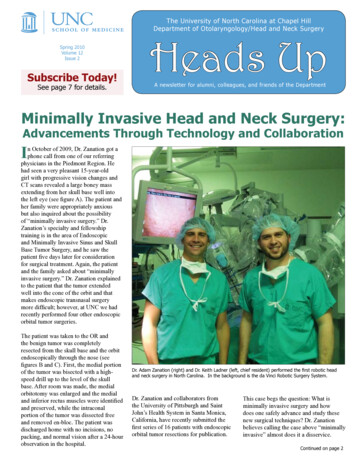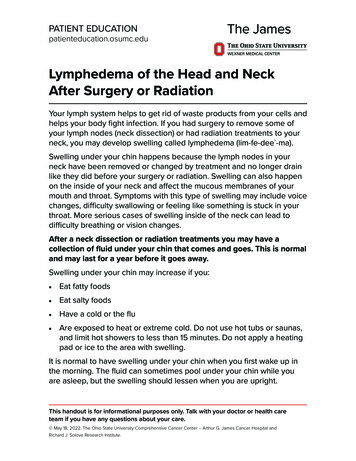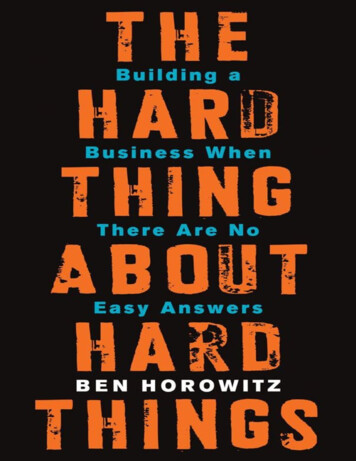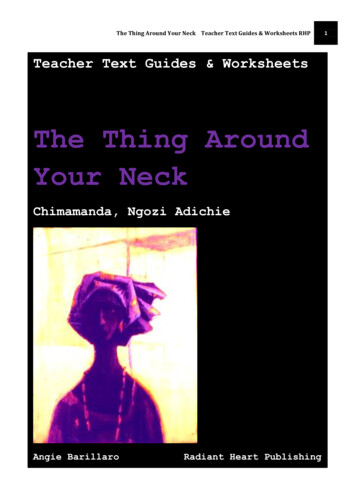
Transcription
The Thing Around Your Neck Teacher Text Guides & Worksheets RHPTeacher Text Guides & WorksheetsThe Thing AroundYour NeckChimamanda, Ngozi AdichieAngie BarillaroRadiant Heart Publishing1
The Thing Around Your Neck Teacher Text Guides & Worksheets RHPTable of Contents The Thing Around Your Neck3Introduction and About the Author4Setting5Historical and Geographical Background8Stories and Questions20Creative Tasks and Essay Topics21Themes24Reviews25Blank Short Story Worksheet26Quotes WorksheetBibliographic Detail:The Thing Around Your Neck Teacher Text Guides and Worksheets Angie Barillaro, 2013Published by Radiant Heart PublishingISBN 978-1-921925-955All images from WikiCommonsRadiant Heart PublishingABN 40 106 238 788P.O. Box 272, North Essendon Victoria 3041Website:www.radiantheartpublishing.orgEmail: radiantheartpublishing@gmail.com2
The Thing Around Your Neck Teacher Text Guides & Worksheets RHP3Introduction - The Thing Around Your NeckChimamanda Ngozi Adichie was born in 1977 in Nigeria the fifth of six children. At the age of 19 she movedto the United States and pursued her writing career. At the age of 21 she published a play For Love ofBiafra and a poetry anthology, Decisions. She studied Creative Writing and African Studies earning aMaster’s Degree in both areas. Adichie enjoys writing as it makes her feel fulfilled. In her writing sheexplores ethnicity and what it means for Africans at home in Nigeria and those living in the United States. Acommon theme is the challenges faced by first-generation migrants.Adichie has won the Orange Broadband prize for fiction and the MacArthur Foundation Fellowship. Hernovels, titled Purple Hibiscus and Half of a Yellow Sun have been translated into many other languages.In 2009, she published The Thing Around Your Neck, a short story collection. Most of the stories deal withNigerian people who migrate to the United States and the conflicts and surprises that need to be faced.“Stories have been used to dispossess and to malign. But stories can also be used to empower, and tohumanize.” - Chimamanda Ngozi AdichieQuestions1. Create a brainstorm page about what you know about Nigeria. If you know nothing about it, whatdo you imagine about it? Discuss with others before putting pen to paper.2. Find out more information about the author.Nigerian Flag
The Thing Around Your Neck Teacher Text Guides & Worksheets RHP4Setting - The Thing Around Your NeckNigeriaResearch Tasks and Questions1. What may be the advantages and disadvantages of being situated where Nigeria is?2. Find out what the population, climate, products and living conditions are like in Nigeria.3. Looking up some websites and/or newspaper indexes in your Library; find out if Nigeria has been inthe news over the last two years. If so, for what reasons?4. As a country, what geographical challenges does Nigeria face?5. Find the statistics relating to people who have left Nigeria. Where have they gone?
The Thing Around Your Neck Teacher Text Guides & Worksheets RHP5Historical Context - The Thing Around Your Neck1472 -Portuguese reach Nigerian coast.16-18th centuries -Slave trade: Millions of Nigerians forcibly sold/sent to the Americas.1830s-1886 -Civil Wars in the South.1861-1914 -British colonisation – ‘indirect rule’1922 -Kamerun is added to Nigeria under League of Nations mandate.1960 -Independence, with Prime Minister Sir Abubakar Tafawa Balewa leading.1962-63 -Controversial census fuels regional and ethnic tensions.1966 January -Balewa killed in coup. Major-General Johnson Aguiyi-Ironsi military rule.1966 July -Ironsi killed in counter-coup, replaced by Lieutenant-Colonel Yakubu Gowon.1967 -Republic of Biafra created by 3 states combining - causing a bloody civil war.1970 -Biafran leaders surrender, former Biafran regions reintegrated into country.1975 -Gowon overthrown, replaced by Brigadier Murtala Ramat Mohammed.1976 -Mohammed assassinated in failed coup attempt. Replaced by deputy, LieutenantGeneral Olusegun Obasanjo, who helps introduce American-Style PresidentialConstitution.1979 -Elections bring Alhaji Shehu Shagari to power.1983More than one million foreigners, mostly Ghanaians expelledMajor-General Muhammad Buhari seizes power in bloodless coup.1985Ibrahim Babangida seizes power in bloodless coup, curtails political activity.1993Military dismisses election results due to popularity of Chief Moshood Abiola.Interim National Government.1993 NovemberGeneral Sani Abacha seizes power, suppresses opposition.1994Abiola arrested after declaring himself President.1998 -Abacha dies, succeeded by Major-General Abdulsalami Abubakar. Chief Abiola dies1999Elections. Olusegun Obasanjo sworn in as president.***
The Thing Around Your Neck Teacher Text Guides & Worksheets RHP6Historical Context - The Thing Around Your NeckNigerian Timeline2000 -Adoption of Islamic, or Sharia, law by several Northern states as Christians protest.Hundreds of deaths.2001 -Tribal war in Benue State, thousands of people displaced.2002 February -Hundreds killed over religious clashes.2003 12 AprilControversial elections; allegations of corruption. President Obasanjo's People's DemocraticParty wins parliamentary majority.2004 JanuaryUN talks between Nigeria and Cameroon about disputed border.2004 May -State of emergency is declared in the central Plateau State after more than 200 Muslims arekilled in Yelwa by Christian militia; revenge attacks are launched by Muslim youths in Kano.2004 August-Deadly clashes- death toll of 5002005 JulyParis Club of Rich Lenders agrees to write off two-thirds of Nigeria's 30bn foreign debt.2006 OctoberSpiritual leader of Nigeria's millions of Muslims, the Sultan of Sokoto, is killed in plane crash.2007 AprilUmaru Yar'Adua - People's Democratic Party is proclaimed winner of the election.2008 NovemberSeveral hundred people are killed during clashes between Christians and Muslims2009 JulyHundreds die in Northeastern Nigeria after the Boko Haram Islamist Movement launches acampaign of violence to have Sharia law imposed on the entire country. Leader killed.2010At least 400 people are killed during violence between Christian and Muslim gangs.President Umaru Yar'Adua dies. Vice-president Goodluck Jonathan becomes President.2010 OctoberNigeria marks 50 years of independence. Celebrations marred by bomb blasts.2010 DecemberChristmas Eve bomb attacks and reprisals kill about 300 people.2011 March -Goodluck Jonathan wins presidential elections.2012 JulyNigeria signs a 4.5bn deal with US-based Vulcan Petroleum to build six oil refineries.2013Massacres throughout year – hundreds killed in various occasions.
The Thing Around Your Neck Teacher Text Guides & Worksheets RHP7Background Context - The Thing Around Your NeckNigerNigeriaNigerian FlagNiger FlagTask: Go to the website FIND THE DATA to check out the differences and similarities between Niger andNigeria. http://www.findthedata.org/Which country is poorer and why?What major challenges do both countries face?Historical OverviewAs you can see from the abbreviated timeline, Nigeria has come through a tumultuous history on all levels,especially political. The past has been filled with corrupt leaders, endless political fighting and overthrowsand religious battles which still continue. Parts of Nigeria have become Muslim states which of course hascaused protestation from the Christians. The Muslims have fought to introduce Muslim or Shari Lawthroughout the country which has been strongly opposed. Whenever one side attacks there are alwaysreprisals from the other side so it seems a never ending battle.As it is an oil rich country, Nigeria is economically positive; at least on paper. However much of its recenthistory has been marred by leaders misappropriating and stealing funds. Aids is a major problem in Nigeriathanks to the level of government denial, as in most African countries. Clearly there has been a lack ofstability and sense of safety for many people which has triggered migration to other countries. An excellent article to read online is AFRICA RISING A Hopeful Continent by Oliver James, TheEconomist, May 2nd 2013. r-past-decade-says-oliver-august
The Thing Around Your Neck Teacher Text Guides & Worksheets RHP8Stories and Questions - The Thing Around Your NeckCell OneCell One is akin to George Orwell’s Room 101 where people are tortured with their worst fears andnightmares. Cell One is also notorious for its no holds barred cruel torture and punishment of prisonersand those awaiting trial. The story is from the point of view of the sister who talks about her brotherNnamabia. They both live on the grounds of the University of Nigeria, Nsukka University in what is clearly aprivileged life. Nnamabia is especially indulged by his mother who often makes excuses for him. There isalso a suggestion he may be involved with gang violence but this is unclear. He has often broken the law insmall ways and now in more serious ways. He is a spoilt and youthful young man; as the story opens he hasstaged a burglary in his parents’ home for his mother’s gold. He believes he is deserving of everything ashis father is an academic at Nsukka University who has always bailed him out of his run ins with the law.At 20 years of age he finds himself detained at the Enugu Police Station, where he is visited by his family.At first everything is taken in stride, but then Nnamabia is enraged at the way an elderly male prisoner istreated by the guards. They are enjoying humiliating and abusing him as he is powerless. Unable andunwilling to hold back, he criticises the guards for the mistreatment of the man, and as a result he istransferred to Cell One and then an even worse place on the outskirts of town. Due to his harsh treatment,Nnamabia appears to learn a lesson and has been subdued. Having witnessed the brutality and corruptionof the Nigerian authorities, Nnamabia leaves the prison having truly learned a lesson about harsh reality.His sister and parents appear to be living in oblivion to the seriousness of what has taken place. It is alsoimportant to point out that the story touches on the reality of campus life and some of the problems beingcaused by students in Nigeria.Cell One Key Points:Plot structure This story begins with backstory to set the context of the characters and the story. Itthen moves to present action ‘This is how it happened’ to tell us the events. The backstory sets the sceneand gives us the background of the mischievous brother. We learn that he is spoilt and that the family arewell off and living in a uniquely protected environment, University, away from the cares of generalNigerian society. This is clear throughout the story as the family appear to be ‘playing’ at life andoverprotected – Cell One is when it starts to become real for Nnamabia.CharactersNnamabia is the key character, the focus of the story. He is described by his sister who says ‘I knew mybrother so well’, but perhaps she is deluding herself to some extent.Physically - Nnamabia is described as sharing many of his mother’s features and he has ‘good looks’; ‘myhandsome brother’.Personality – ‘Nnamabia was very popular’ says his sister. We learn that this is because he is very sociableand outgoing, quite the life of the party. The girls loved him and the guys respected him. His nickname was‘The Funk!’.
The Thing Around Your Neck Teacher Text Guides & Worksheets RHP9Stories and Questions - The Thing Around Your Neck - Cell OneNarratorNnamabia’s sister seems to be invisible, as though living in her brother’s shadow. He is thecentre of attention, not her. Her role, at least in this story is to remain in the shadows, observing andrecalling the events. Any information about her is gathered as she reacts and comments on her family’sbehaviour. She is not impressed by her ‘professor father’ who is clearly living a tidy life on paper and notone to get his hands dirty. We know she is appalled by her mother’s response and overprotection of herbrother as ‘I wanted to slap her’. Perhaps there is a sense of sibling rivalry as she does not seem tooconcerned by her brother’s ordeal.ToneThe narrator’s tone is one suited to an objective observer, detached from any investedemotion. This only changes when she becomes impatient with her parents and brother. She does becomequite agitated when describing the ‘Cult wars’, which ‘was senseless’. Although seemingly passionless,there is a tinge of sadness at the end of the story.TimeNnamabia’s experiences in the present time cover about 10 days and the story isinterspersed with flashbacks and flash forward ‘Later I would realise that at that moment each of ussuspected privately that Nnamabia had been killed ’SuspenseAt the start of the story we do not realise the seriousness that is about to follow, especiallyas there are so many possibilities and ambiguities regarding whether Nnamabia is involved with the Cultboys and if he is really guilty. If so, to what extent? These unanswered questions raise the tension andcreate suspension.ThemesThe story is about growing up and reaching maturity. Clearly Nnamabia is self-centred andimmature. It is only until he is in the prison cell with the old man that he starts to get ‘real’. In sticking upand defending the old man he has seen that he has just been playing at life and being a silly rebel, but reallife must not be ignored. Through the parents we also see the generation gap between the siblings andtheir parents, who have fought hard to ensure their children are protected from the outside world, almosta rejection of Nigerian culture. Instead they have been bred on American television and consumerism andliving in denial.Questions1. What was stirred inside Nnamabia that made him complain about the old man’s treatment?2. How connected is the family in this story? Discuss.3. Although the family in this story live a fairly quiet and protected life on the campus, what darkerelements almost intrude on their ‘protected’ existence that reflect wider Nigerian issues?4. Describe the role you think the narrator has in this story.5. Find three quotes from this story that support the themes.6. Which elements of this story are global and could happen anywhere else in the world? Discuss.7. Cell One represents corruption, brutality and lawlessness – hinted at in the story. To what extent isthis a serious problem in Nigeria? (Research)***
The Thing Around Your Neck Teacher Text Guides & Worksheets RHP10Stories and Questions - The Thing Around Your NeckOn Monday of Last WeekKamara arrives in America to live as a married woman with her husband and life changes very suddenly.For financial reasons, Kamara stops studying her Master’s Degree to take up a poorly paid babysittingposition to look after Josh in his parents’ home. Here Kamara begins to observe Americans and Americanlife, which in this case is clearly middle classed. Josh’s mother Tracy fascinates Kamara, and slowly shebegins to alter parts of her appearance and behaviour so that she can fit in better. Tracy spends all day inthe basement where she has set up a studio and is not to be disturbed.In particular Kamara is bemused by Josh’s father Neil, who is an over the top, overprotective and anxiousparent, where every detail is fretted over. Josh, the child, is obedient and docile, almost to the extreme.Neil neurotic obsessiveness provides some entertainment for the reader as it is hard to take him and hiswife’s attitude to parenting one child seriously. We see little real emotional connection in the family, just aseries of logistics to be planned and organised. Kamara is able to calm down Neil and reassure him that heis panicking for nothing. It is funny to think that Kamara is using such an atypical family to representAmerican families, although clearly there are differences between American and Nigerian attitudes to childrearing.NarrativeThis story is written in the third person narrative voice. Use of dialogue is interspersedthroughout effectively recreating characters speaking such as Josh.Characterisation- Told from the point of view of Kamara and what she is learning and changing aboutherself. The relationship between the child and Kamara is clear, especially with their little routine regardingthe glass of spinach juice! The details about the household and the finicky, organic ‘health’ foods the familyeats, and expects the child to eat tell us the family has a)more than enough money to buy such overpricedgoods and b)a tendency to obsessiveness. Neil is especially a nervous type; it is amazing he can function atwork. The couple seem to have a great deal of time on their hands and certainly are not struggling to makeends meet or care for a large, demanding family.Plot- The story begins from the moment of the present when Kamara started to change and observeherself in comparison to Tracy and American women. It then goes back to when Kamara and her husbandmet and their later plight to settle into America. Then we are back in the present time with furtherreferences to last Monday, when Tracy and Kamara met. Is there sexual tension between the two?ThemesThe story seems to be asking us to look at parenting and family; what makes a loving family?What do children need? Perhaps there is a suggestion that reading parenting books incessantly is notwhere the answers are? Furthermore there is clearly a natural affection and connection between Josh andKamara, which almost causes a problem with Neil, when he discovers that Josh has made her a card thatthanks her for being in his family. One wonders how the parents will cope with the onslaught ofadolescence – Neil has not seen anything yet!Question-What is the lure of Tracy? Discuss their encounters.
The Thing Around Your Neck Teacher Text Guides & Worksheets RHP11Stories and Questions - The Thing Around Your NeckImitationThis story is representative of one of the many diverse experiences many women have as migrants toAmerica. The main character Nkema is living a privileged life in America imitating the best life can offer toher in America. Her children go to the best schools and her husband is having an affair back home inNigeria where he spends most of his time on business. She is feeling inner turmoil and emptiness,especially as she feels she is imitating someone else’s life that has nothing to do with who she really is.Changes begin to take place; she cuts off her hair, starts openly confiding with others and confronts herhusband regarding the affair. This is interesting because traditionally, Nigerian men practise polygamy.Adiche has said in interviews that this story is typical of the experiences of Nigerian women and even mento some extent. They buy into the American Dream and convince themselves this will make them happy,only to realise they have bought into a consumer delusion. It also points out the reality of the isolation andemptiness many migrants feel in a new country.(This story is not on the VCAA list of stories to be read)Questions1. What do you think happens once someone has migrated to a new country with so many hopes anddreams, only to find it was not really what they expected?2. Find three quotes to suggest that Nkema is unhappy.3. What aspects of the ‘other woman’ back at home seem to play on Nkema’s mind?4. Discuss the symbolism of the hair cutting and the Benin Masks.5. Does the story end on a positive note with regards to Nkema’s future? Discuss.6. Isolation is a significant reality for many immigrants. How can this be avoided?
The Thing Around Your Neck Teacher Text Guides & Worksheets RHP12Stories and Questions - The Thing Around Your NeckA Private ExperienceThis story is set in Nigeria and sadly represents many of the religious based violence that has taken place inthe past and continues to do so, between Muslims and Christians.When a Christian man drives over the Qur’an in Kano, he is seized and decapitated. This sparks a frenzy ofviolence in the streets. At this time, Chika and Nnedi are visiting an aunt in Kano and when the violencebreaks up they become separated. Chika, an Igbo Christian ends up finding refuge in an abandoned shopwith a Muslim/Hausa woman. The two women are both just trying to survive against the craziness outside.Whilst together in the shop, they begin to talk to each other and share information. When the Muslimwoman discovers Chika is a medical intern, she asks her to check her burning nipples and Chika gives hersome advice. There is tenderness and kindness between them, even though outside the fighters arehacking each other to pieces with machetes. It is almost surreal, as though what is going on outside is nottheir domain but something else altogether.Perhaps this highlights that much of the inter-religious fighting is more political and ideological rather thanreally representing the angst of the people. It was most likely an accidental running over of the Qur’an, asthe Christian was on his own in a Muslim district. The response was fanatical and tyrannical. The observer‘who happened to be Muslim, pulled him out of his pickup truck, cut his head off with one flash of amachete, and carried it to the market asking others to join in; the infidel had desecrated the Holy Book’.Incredibly, this results in hundreds of corpses strewn around the streets and ‘it will strike her that shecannot tell if the partially burned man is Igbo or Hausa, Christian or Muslim ’.The politics of hate have become ingrained within the media as ‘Later Chika will read in ‘The Guardian’“that reactionary Hausa-speaking Muslims in the North have a history of violence against non-Muslims.”’ Itis almost as if a game is being played out. (Igbo Nigerians are usually Christian; Hausa Muslims are fromNorth Nigeria)Questions1.2.3.4.5.6.7.What statement is Adiche making about religious intolerance and the politics of hate?Do we ever find out what happened to Chika’s sister?Why do the two women in the shop not discuss the violence?Do you think the media – local and international are helpful to countries like this? Discuss.The two women quickly find somewhere safe to hide; what does this suggest?What is the Qua’ran?Describe the style and structure of the story.
The Thing Around Your Neck Teacher Text Guides & Worksheets RHP13Stories and Questions - The Thing Around Your NeckGhostsIn this story, three elements are deftly tied together by the author. Firstly, James Nwoye, a seventy oneyear old retired professor keeps going back to the University where he worked to ask about his pension,which is long overdue. On one such occasion he meets an old friend Ikenna Okoro whom he had assumedwas dead. When they begin speaking about the past, we discover the professor’s daughter Zik died in theNigeria-Biafran war and he has another daughter who is now working as a doctor in America. During thewar the family had escaped to the United States and then returned, but could not face the mess that hadbeen their former home. Now the professor’s wife, Ebere is dead, but he still feels her presence as shevisits him as a ghost and comforts him by moisturising his skin as she used to when she was alive.There seems to be a motif of powerlessness throughout the story as people struggle with issues, especiallywith the government. The Professor must constantly be asking for his well-deserved pension. Thispowerlessness also ties in with impotence in both America and Nigerian life.We see the poverty-stricken Nigerians sitting under the flame tree, shouting abuse at the vice chancellor,accused of embezzling school funds. “His penis will quench,” His children will not have children” (58). Thevictims of the Biafra war feel helpless in such a corrupt nation. The professor and Ikenna have also lost anyfight. Nwoye says that Ikenna’s laugh has become “discolored, hollow, nothing like the aggressive soundthat reverberated all over the Staff Club in those days” (62). This is of course a clear sign of aging, but thepeople seem defeated and overwhelmed with life.Adiche claims she enjoys this story because the professor is ‘ this man who should be a person whoautomatically thinks that ghosts are ridiculous, but instead, actually, finds that a ghost has become asource of joy’. She also sees this as a story about the importance of education.Questions1. Discuss the themes in the story.2. What do you make of the fact that the professor says he sees his wife as a ghost? To what extentcan we understand this?3. Describe the various experiences of ‘home’ in the story for the characters.4. Why is the professor not receiving his pension?5. What is the significance of America and speaking English in this story? Discuss.6. How would you describe the mood and tones of the story? Where do they vary?7. Do you agree that this story is about powerlessness?
The Thing Around Your Neck Teacher Text Guides & Worksheets RHP14Stories and Questions - The Thing Around Your NeckThe Arrangers of MarriageThis story depicts the experiences of Chinaza, and her new life in New York with Dave her new husband.They are both from Nigeria and Dave has already settled in the flat before his new wife arrives. It is clearlyan arranged marriage, and we see how eager Dave is to lose any hints of Nigeria and embrace America.Right from the start, Chinaza is not impressed; the flat is barely decorated and small; her doctor husband isjust a resident in the local hospital and making very little money. She had come to America expecting a bighouse with a big driveway, like she saw on the programs on television. Not so. The story is narrated byChinaza who keeps a running mental list of what the ‘arrangers of marriage’ had not told her. This isinteresting as it contrasts what she is thinking and feeling with her seemingly selfish husband who does notseem to be aware of her needs and views. We see this in the way he ‘makes love’ to his wife, no consent orforeplay, sex is just about his experience and his pleasure.It is not hard to imagine being unimpressed, although Chinaza bides her tongue until the final revelation,that Dave was previously married here in the United States in order to get a Green Card. When she beginsto wonder where her Green Card is, she finds out her husband has not even lodged it. Although she wantsto leave immediately, Chinaza realises she is stuck at least for the present while.In this story, food and language are used metaphorically to represent two approaches to the migrantexperience. Ofodile (Dave) has tried to wipe out his culture and past by forcing himself to totally embraceand imitate American language and culture. His choice of name change to ‘Dave’ is comical as it seems veryout of place. His adaptation of American culture is extreme and artificial, but he forces himself to take itseriously – and he does. Dave is actually doing this out of fear of not belonging and not making it inAmerica. Hence when Chinaza arrives, he is constantly teaching her the appropriate American words tosubstitute – ‘cookies’ not ‘biscuits’ and ‘elevator’ instead of ‘lift’. In particular he does not want his wife tospeak anything but correct American English, especially around Americans.When Chinaza makes some tasty food, Dave is paranoid that it has a strong smell and may draw attentionto their ‘otherness’. In fact it does when one neighbour comes in to check on the smell that has permeatedthe whole block of flats -‘It smells really good .the problem with us here is that we have no culture, noculture at all.’ Although this story addresses serious issues, it is quite a humorous story.Questions1.2.3.4.‘Speak English There are people behind you.’ Describe Dave’s idea of fitting into America.What are the positives and negatives of Dave’s adaptation to America?How do we know that Chinaza has bought into ‘The American Dream’?In your opinion, what may be the consequences of losing your own culture and adapting acompletely foreign/new one?5. To what extent do countries expect their immigrants to ‘adapt’? Discuss, with reference toAustralia.6. What is the purpose of Nia in this story?
The Thing Around Your Neck Teacher Text Guides & Worksheets RHP15Stories and Questions - The Thing Around Your NeckThe ShiveringTwo tragic events have occurred in Nigeria; the death of the First Lady and the crash of a plane. Back homein New York, Nigerian woman Ukamaka is desperately trying to find out more information, especially abouther ex fiancé as he has been travelling to go to a wedding. Another Nigerian man, from the third floor ofher building, Chinedu, comes to offer her comfort and support during this dark time as she tries to find outif her ex-fiancé is one of the dead in the plane crash. They spend time praying together and talk aboutmany things, including Chinedu’s homosexuality. In the end everything is all right as the ex-fiancé was noton the plane.Questions1.2.3.4.5.6.Describe Chinedu and Ukamaka, using quotes to support your answer.What is the main theme of the story and why.Why was Ukamaka reluctant at first to let Chinedu into her home?Why did they pray Pentecostal prayers?How is religion perceived in this story? Discuss.What fears is Chinedu facing?Stories and Questions - The Thing Around Your NeckThe American EmbassySet in an exclusive part of Lagos, this story brings us face to face with military brutality and corruption. Awoman joins a large crowd and long line waiting in to obtain American visas. The military is used to keepthem under control; often resorting to violence. ‘A soldier was flogging a bespectacled man with a longwhip the man’s hands were raised as if to ward off the whip.’ The woman thinks back ―”two days ago,she had buried her child in a grave near a vegetable patch in their ancestral hometown of Umunnachi.”This occurred because the government sent gunmen to her home, to find and arrest her husband who wasa pro-democracy activist who published ‘controversial’ material. He
The Thing Around Your Neck Teacher Text Guides & Worksheets RHP 6 Historical Context - The Thing Around Your Neck Nigerian Timeline 2000 - Adoption of Islamic, or Sharia, law by several Northern states as Christians protest. Hundreds of deaths. 2001 - Tribal war in Benue State, thousands of people displaced. 2002 February - Hundreds killed over religious clashes.


